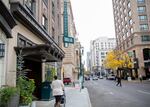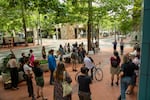Portland city officials are moving forward with a renewal of a five-year, $25 million contract for cleaning and security services downtown.
The proposal, which was released to the public last week after months of closed door negotiations, responds to some of what have long been considered the most controversial aspects of Downtown Portland Clean & Safe, a nonprofit that provides extra security and cleaning services over a 213-block area of the central city: how private security guards paid by the district treat people experiencing homelessness and whether those guards should be armed.
Among the changes: The contract states that no more than a quarter of security working at any one time can carry guns. The district will fund a three-person “community mental health outreach team.” Officials will make it easier for the public to file complaints on security guards.
But there’s one topic that some monitoring the negotiations feel has been left out completely from the discussion: the way that money flows from downtown businesses through Clean & Safe and into the pockets of the city’s biggest chamber of commerce, the Portland Business Alliance.
“What I see everyone talking about with the Clean & Safe contract, for me, is so far from the actual problem,” said Jessie Burke, the head of The Society Hotel and a former Downtown Clean & Safe board member.

A woman walks past the Woodlark Building, home of the Woodlark Hotel, on Tuesday, Oct. 15, 2019, in downtown Portland, Ore. The hotel is at the corner of Southwest Alder Street and Southwest Park Avenue on the western side of the downtown Clean & Safe district.
Bryan M. Vance / OPB
In return for cleaning and security services on top of what the city provides, every property owner in the district pays Downtown Clean & Safe an annual fee. These fees can range from a few hundred dollars to over $200,000 depending on factors that include the size of a building and its assessed value. The city itself, which owns property downtown, paid over $150,000 last year, according to city records.
That money is collected by city government and passed on to Downtown Clean & Safe. Some goes to the Portland Business Alliance, with which the district contracts to help manage the program. That’s one big sticking point for critics of the contract: Burke said that based on her analysis of the Clean & Safe’s 2020 budget document, all PBA employees are paid at least partially with Clean & Safe money. Essentially, PBA relies on Clean & Safe to pay some of its bills.
Burke said her problem with the setup is simple: people paying for Clean & Safe services may not know the money collected from them by the city helps pay some PBA overhead costs and salaries of PBA employees. In effect, she said, this arrangement means the city is subsidizing the business chamber while sucking away resources that could be used to rebuild and restore downtown.
“It’s like one third of their budget, and no one seems to know, and it’s totally baked into the contract right now,” said Burke, who served on the board of the district for three months before resigning this January after failing to convince other nonprofit leaders to end their contract with the business alliance. “Everyone’s like, ‘Let’s talk about how many people get to carry a gun’ and I’m like, ‘Great, so you’d have way more money to work with if you took this out of it.”

Community members gather in front of The Portland Building in Southwest Portland to rally against the renewal of the Clean & Safe 10-year contract, July 27, 2021.
Hanin Najjar / OPB
Willamette Week first reported on the unusual financial relationship between the two organizations earlier this year, noting that money from Clean & Safe funds about 45% of the salaries of PBA staff. In response, leaders at the district and the alliance emphasized that the two organizations viewed the structure as the most efficient way to serve downtown and that the challenges facing the heart of Portland, which has been ravaged by the pandemic, required a “multi-layer response.” The two groups said they were looking for ways to improve as they headed into a possible contract renewal.
But the reporting and the ensuing outcry have done little to change the actual contract. The complex financial relationship between the alliance and the district appears to be largely the same.
“All the key positions are still from the Portland Business Alliance,” said city performance auditor Alexandra Fercak, who released an audit last year highly critical of the city’s lax oversight of all three of its enhanced services districts, city-authorized zones where property owners pay extra to have services on top of what the city provides.
After reviewing the Downtown Clean & Safe contract, Fercak said she was pleasantly surprised at how many of the issues she found in her audit were addressed in the proposed contract. The months of negotiations led to some notable changes including a new complaint process for the public to hold private security officers accountable, the new mental health outreach workers and required de-escalation training.
But she said the convoluted relationship between Clean & Safe and the alliance appears to be left for city leaders to address down the road.
More scrutiny coming
Heather Hafer, a spokesperson for the city’s Office of Management & Finance, said the bulk of the city’s response to the problems laid out in the audit will take place during a future audit review process that will examine “all parts of how ESDs operate in the City of Portland.” The contract gives the city the right to change the Downtown Clean & Safe agreement based on the outcome of that review.
Hafer noted the relationship between Downtown Clean & Safe and the Portland Business Alliance is not unique as all three districts subcontract with other groups for management services. (Central Eastside Together, which focuses on business development, security, and sanitation services, contracts with the Central Eastside Industrial Council. Lloyd, which focuses on transportation and urban development, contracts with Go Lloyd)
“Given that this is an issue affecting all of the ESDs, it was decided that it would be more efficient to examine issues related to these relationships as part of the City’s audit response rather than one contract at a time,” wrote Hafer.
The proposed new contract also does not impact the governance structure of Clean & Safe. Under the current setup, the executive director of the Clean & Safe district reports not to its own board, as is common with nonprofits, but to the Portland Business Alliance.
The contract does make one notable change to the relationship. It assigns how high-ranking members of the PBA are supposed to split their time between the district and the alliance. For example, Andrew Hoan, the president of the PBA and President & CEO of the district, is supposed to dedicate 45 percent of his time to the district. Jon Isaacs, a vice president for both the alliance and the district, is meant to give the district half of his time.
Anita Davidson, who pays into the district as a board member for her condo association, said she felt this part of the contract further entwined the two legally distinct groups.
“I don’t think the independence issue is addressed in anything that’s proposed right now,” said Davidson, who has been closely following the negotiations. “The behind the scenes, the inner workings of the two organizations, have not changed one bit.”
Davidson serves on the board of the Portland Plaza Condominiums, a downtown condo association that pays $42,000 into the district each year. Davidson said her main concern is that, unlike businesses affiliated with the Portland Business Alliance, neither she nor any other ratepayer can opt out of supporting the special district. Her condo association, which is not a member of the PBA, has no choice but to indirectly subsidize the alliance’s lobbying efforts.
“The PBA is a legitimate lobbying organization. It has business interests in mind,” she said. “Because the fees are mandated, we as ratepayers have no choice. ... We are in essence being forced to support political positions that we may or may not agree with.”
City council members are expected to pass the new contract. They’re scheduled to vote Thursday afternoon.


